February 27, 2015
Dr. Hans Rausch was our family physician until I was seven or eight and he retired. I have a lousy memory for things of my childhood, but I well remember this man. He was short and chubby, wore oddly tailored and color clashing clothing, and sported a mustache that today I would recognize as ethnic. He spoke with a pronounced, German accent and had difficulty with English syntax and expressions. He’d tease me with a St. Nick chuckle, and he always called my mother ‘Mama.’ He had those old Highlight children’s magazines in his waiting room. I loved to go and see him. I suppose I remember him so well because he was so foreign. I didn’t know any other Germans when I was six, and I don’t remember any of my later doctors. The foreign, particularly to a six-year old, can be threatening. But rather than a memory of fear and regret, his gentle, kind character yields a soft, welcoming recall, and I’m involuntarily smiling as I write this.
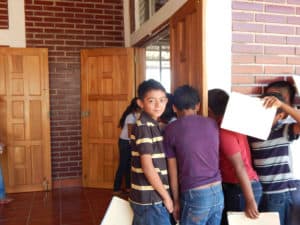
Brown University with Wingate University came down on a brigade last week to the small village of Guachipilincito. I never had patience enough to learn phonetics and I imagine most reading this didn’t either. Roughly, it’s pronounced “watch (light on the ‘t’ sound) + the letter ‘e’ + pea + lean + sea + toe.” When I think of foreign, I think of Guachipilincito. Though it’s only two or three miles from Concepción, it’s an hour and a half on foot and an hour by a four wheel drive vehicle. Birds can get there in a matter of minutes, but any creature limited to ground travel is subject to a challenging quest. It’s not a place to visit. Unless you live there, you don’t go there. Those who do live there, stay there, unless they need to stock up on supplies. The Guachipilincito people are poor, isolated, independent, and “of their own.” For persons from the US, there’s the foreignness of Honduras coupled with the foreignness of Guachipilincito.
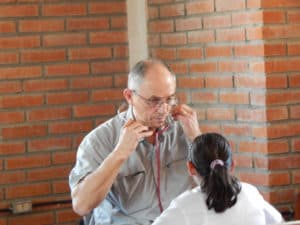
Laura and I visited Guachipilincito and the brigade last Tuesday. (You can read about how we almost didn’t make it there at https://manshipblog.wordpress.com/. But please finish this blog first.) We were surprised by what we found. It didn’t feel foreign at all. In fact, the overwhelming sense was one of familiarity. The doctors and the pharmacists were seeing children from the fourth, fifth and sixth grade. The children stood in line, not anxious or fearful, but joyful. Like all kids do, they fooled with one another, but no one was out of control or acting up. They waited in line with patience as if they had all done this a thousand times before. As they moved up close to their turn to enter the examining room, their smiles widened, not from insecurity, but rather with a joyful expectation. We peered into the examining room and spotted Dr. Emily. She was testing a little girl’s motor skills by raising her arms and asking the child to mirror her movement. Dr. Emily wears a brilliant smile, the movements are graceful and uninhibited, and though we can only see the girl’s back, it’s clear the game is thoroughly enjoyable. The scene is tribute to the beautiful ease of human connection.
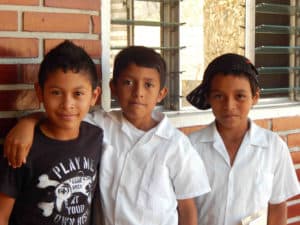
Dr. Emily, Dr. Wayne, and Dr. Tamika are all veterans on this brigade. They clearly like being in Guachipilincito. Robert, the pharmacology professor, and Kelly, the Wingate PharmD student are new to Guachipilincito. But even they are absorbed into this air of familiarity as they fill prescriptions for the children. All of them are in a place where everything is different, and yet they seem to be so at home. To the children of Guachipilincito, the brigade members cannot be anything other than foreign. To Dr. Emily, her husband Jim, Dr. Wayne, Dr. Tamika, Robert, and Kelly, the people of Guachipilincito cannot be anything other than foreign. But this is not what seems to matter. 
I wonder about this little girl who mirrors Dr. Emily raising and stretching her arms. Maybe she’ll live out her days in this small, secluded village of Guachipilincito. Maybe she’ll move out beyond the confines of such isolation and poverty. In either case, she will remember Dr. Emily. The sincerity of human kindness has taught her a priceless lesson. Language, customs, and culture are not the things that separate, limit or determine us. When employed with a willing and believing heart, they liberate us.
Laughter and Song
February 21, 2015
The brigades do amazing work while they’re here and Virginia Commonwealth University (VCU) is no exception. This VCU brigade arrived with a substantial group of residents and doctors from Fairfax Family Practice Centers (FFPC), the primary supporting organization for this brigade. The clinic in Pinares that they founded and support is located just off the highway, a rutted out, treacherous, mountain, dirt road heading south from La Esperanza to the border of El Salvador. Because Pinares is only forty minutes outside of La Esperanza and because the road is much nicer here, still paved in sections and prior to the precipitous drop through the mountains, one could be deceived that the people who live here are better off than their neighbors further south. But, the people here are extremely poor, amongst the poorest in the Department of Intibucá, indeed in almost all of Honduras. It is a very desolate area where most families survive on subsistence farming and a tiny amount of income during coffee harvesting season. They seldom find their way out of Pinares.
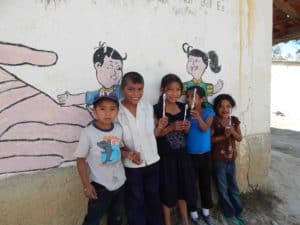
In some ways it is as if the circus has come to town. The brigade arrives in a festive air. The foreign doctors, nurses, pharmacists and students, their medical instruments and supplies, and even their luggage present a novelty. But the people come with serious purpose. They have not even had the opportunity for health care since the last time a brigade came through. We arrive to visit them on a Thursday morning. Half the brigade members stay at the school where they also camp out and have their meals. They are seeing local children for the CHI (Children’s Health Initiative) program. Heights and weights are recorded, eye exams administered, and blood checked for anemia. The children see a doctor, a pharmacist, and get a dental exam. The children are precious, smiling, laughing, and playing. They love to pose for Laura’s camera, and they love it when a brigade member takes a moment to ruffle their hair or poke them in the belly. They patiently wait their turn and hold their breath when their finger is stuck, drawing blood for the anemia check. They’re like all kids really, full of life, a sense of wonder, freshness and hope. But their clothes tell you they are not like all kids. Torn, stained, and faded, a size or two too big or too small, poverty is their inheritance. Many of them will not travel beyond the four or five square mile area that is home.
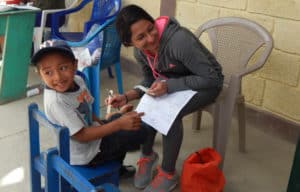
A few kids are sent over to the clinic because they present with a problem that can’t be resolved with vitamins, antibiotics, toothpaste, or Tylenol. One boy, maybe twelve, has a half-dollar sized wound on the ball of his right foot. Maybe it’s a burn from stepping barefoot on one of the ubiquitous rubbish fires. The tongue depressor pressed against the surrounding skin tickles, and he giggles. Odd that the lilt of laughter portends infection. We take the fifteen minute walk over to the clinic where we meet up with him and his mother again. She looks lost, not knowing what to do, perhaps the strange white persons and gowns, the unintelligible voices, and the crowds are overwhelming her. She has to sign in to wait her turn, but she is hesitant to do so, and maybe if we didn’t help her through it, she would have left. Poverty makes you vulnerable in so many ways.
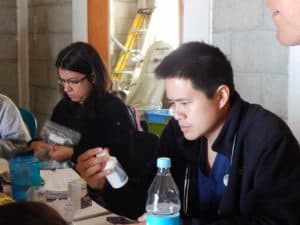
We get some time to talk to Dr. Winston, the brigade leader whose been coming down to Pinares for many years. I sense great compassion and commitment for these people he serves so well. We ask him about the brigade’s accommodations at the school. It is a very run down building with dirt floors, dark, dank, and dusty. Why hasn’t VCU constructed some dorms as other affiliates have done, after all you’re here at least three times a year? He says they’ve often considered it. But, he wouldn’t feel so comfortable in a nice dorm knowing how most of the people here live. Besides, the money could be better spent. When we’re ready to leave, the young man with the wound on his foot is still waiting to be seen, but his mother seems more comfortable waiting.
While we wait for the bus to take us back to Concepcion, we purchase a light lunch at the roadside kitchen just below the clinic. A young boy is sitting on a bench. He has on big, rubber boots, farmers clothes, and carries a machete. He’s stunted. Is that because of his Lenca heritage or poor nutrition? He looks about the same age as the boy with the wound on his foot, but maybe he’s older. Could he be fifteen, eighteen, maybe even twenty? In any case, he’s too young to carry such weariness in his face and his eyes. He tells us he’s never been to Concepción, the neighboring town. Maybe he’s never been to La Esperanza, just a short trip up the road. His life seems much too narrow. We get on the bus. We know that the work VCU and FFPC is doing is so very important, but it’s hard to celebrate. The mood is somber and sober, our quiet witness to the palpable poverty.

Almost every night in our humble, but very comfortable, house in La Concepción, we are serenaded by at least one, often two, evangelical church gatherings. We listen to the rhythmic, rat-a-tat, Christian hymns that draw the congregation to the service. They’re a little droning, even jarring, until we hear the preacher booming out an emotional, tear-jerking sermon. It’s what Concepción has for entertainment. Generally we laugh at the routine, but tonight after Pinares, maybe we’re hoping for something a bit more uplifting. The pianist at one of the churches is apparently more accomplished than the simplistic Christian hymns would indicate. Warming up for the service, the musician performs something of a small concerto. I recognize, but can’t name, the first soft, moving, but complex piece. It draws Laura and me out on our porch, listening, and soaking in this precious gift. The next tune is from the Sound of Music, A Few of My Favorite Things, followed by Carly Simon’s Killing Me Softly. We stand in silence, holding on to this moment for ourselves as much as for the people of Pinares.


